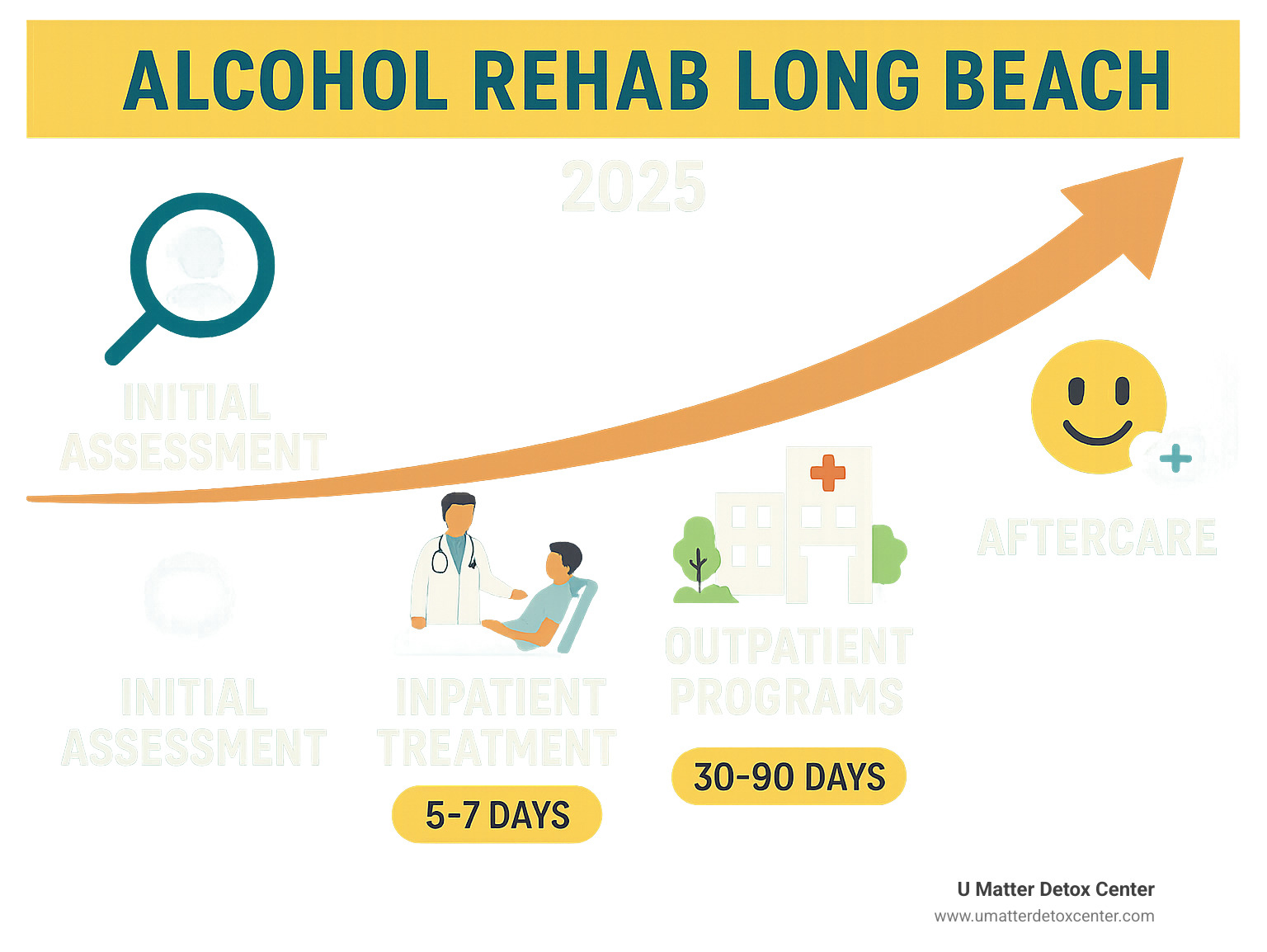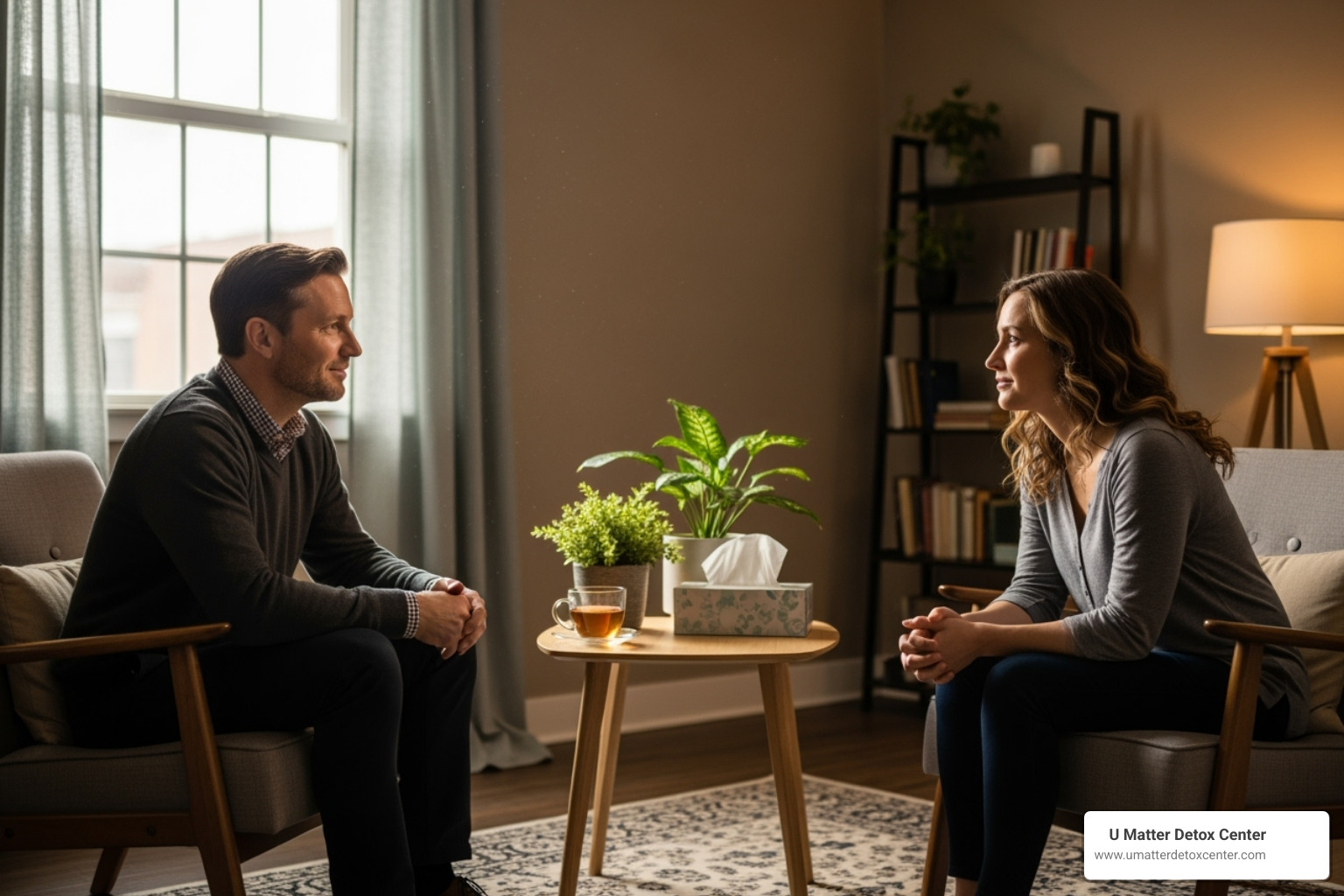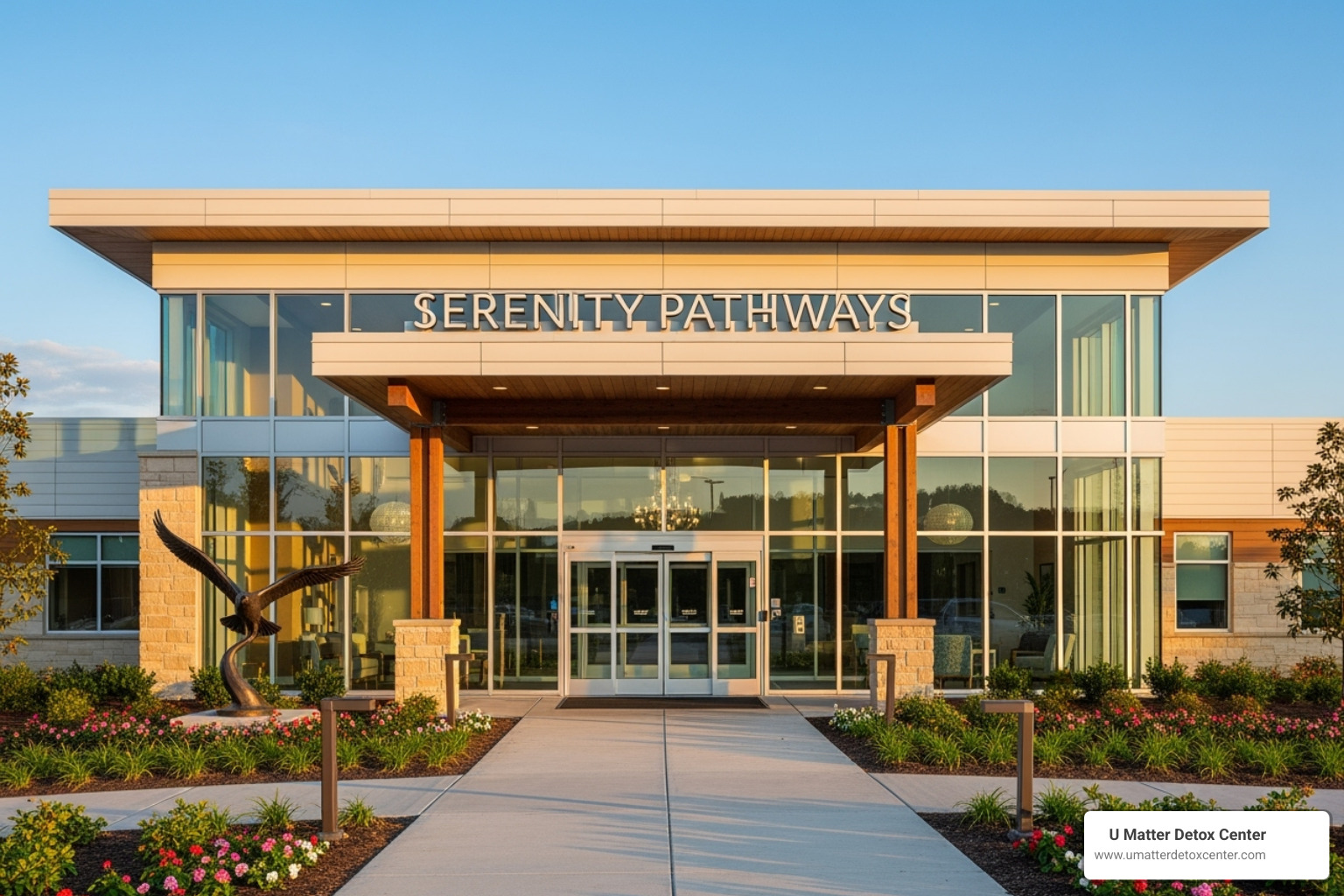Why Long Beach Residents Need Quality Alcohol Rehab Options
When you're ready to take the first step toward recovery, finding the right alcohol rehab long beach options can feel overwhelming. Fortunately, Long Beach offers a variety of comprehensive treatment programs designed to meet your unique needs.
Quick Guide to Long Beach Alcohol Rehab:
- Medical Detox: 5-7 days of supervised withdrawal management
- Inpatient Treatment: 30-90 day residential programs with 24/7 support
- Outpatient Programs: Flexible scheduling for work/family commitments
- Intensive Outpatient (IOP): 9-20 hours of weekly therapy
- Partial Hospitalization (PHP): Day treatment with evenings at home
- Dual Diagnosis Care: Integrated treatment for addiction and mental health
- Holistic Approaches: Mind-body therapies, nutrition, and wellness support
The statistics paint a clear picture of why quality treatment matters. The Long Beach Fire Department reported 406 overdoses involving suspected drug use, while the city saw 286 substance-related deaths from 2014 to 2018. Within Los Angeles County, 8.4% of people aged 12 and older have been diagnosed with a substance use disorder.
But here's what gives us hope: recovery is possible. Professional treatment centers in Long Beach combine evidence-based therapies with personalized care plans. Whether you need the structure of inpatient care or the flexibility of outpatient programs, there's a path forward that fits your life. The key is finding a program that addresses not just the addiction, but your individual circumstances and goals.

The Landscape of Alcohol Use and Recovery in Long Beach
Long Beach's stunning coastline and vibrant community spirit are well-known, but beneath the surface, many families face the challenge of alcohol addiction. Understanding the local situation is the first step toward finding hope and healing through effective alcohol rehab long beach programs.
Understanding the Local Challenge
The numbers tell a sobering story. The Long Beach Fire Department responded to 406 overdoses involving suspected drug use, and the city documented 286 substance-related deaths between 2014 and 2018. Alcohol is a significant factor in these tragedies.
Across Los Angeles County, the broader picture includes 2,990 annual alcohol or drug-related deaths and over 285,000 related emergency department visits and hospitalizations. Critically, 8.4% of people aged 12 and older in LA County have a diagnosed substance use disorder. That's nearly one in twelve of our neighbors struggling with addiction.
This issue affects the entire community, from public safety concerns to challenges for local businesses. It's a clear sign that accessible, compassionate treatment is essential for everyone, across all age groups.
Local Laws and Support Initiatives
Fortunately, Long Beach and California are adopting innovative approaches that treat addiction as a health issue. These initiatives create a supportive environment for seeking help.
Priority Access Diversion (PAD): This program connects individuals facing misdemeanor charges with clinicians instead of prosecutors, offering treatment as an alternative to the traditional legal process.
Law Enforcement Assisted Diversion (LEAD): This initiative empowers police officers to divert people with minor substance-related offenses to social services and treatment resources, emphasizing compassion over punishment.
California Good Samaritan Overdose Prevention Law: This law provides legal protection to anyone who calls 911 during an overdose emergency, removing the fear of arrest for minor drug violations and encouraging people to save lives.
These progressive policies help build a community where seeking help is seen as an act of courage, making lasting sobriety more attainable for everyone.
Types of Alcohol Rehab Programs Available
When you're ready to begin recovery, understanding your options for alcohol rehab long beach is key. There is no single path that works for everyone; treatment is a spectrum of care designed to meet you where you are.
Some people need the intensive support of 24/7 medical supervision, while others thrive with flexible outpatient programs that accommodate daily responsibilities. The main levels of care include:
- Medical Detox: The foundation for many, providing safe withdrawal management under medical supervision.
- Inpatient Residential Treatment: Living at a facility for immersive, intensive care.
- Partial Hospitalization Programs (PHP): The highest level of outpatient care, with treatment during the day and returning home at night.
- Intensive Outpatient Programs (IOP): A step-down from PHP, offering 9-20 hours of therapy per week.
- Standard Outpatient Programs: The most flexible option, allowing you to live at home while attending regular therapy sessions.
Choosing between inpatient and outpatient care depends on your specific needs. The table below highlights the key differences:
| Feature | Inpatient Treatment | Outpatient Treatment |
|---|---|---|
| Environment | Live at the facility 24/7 | Live at home, attend scheduled sessions |
| Structure | Highly structured, intensive | Flexible, fits around work/family |
| Time Commitment | 30-90+ days, full-time | Varies from a few hours to 20+ per week |
| Best For | Severe addiction, co-occurring disorders, unstable home environment | Mild to moderate addiction, strong support system, need for flexibility |
The First Step: Medically Supervised Detox
The thought of withdrawal can be intimidating, but medically supervised detox makes the process as safe and comfortable as possible. Quitting alcohol "cold turkey" at home can be dangerous, leading to severe complications.
During a typical 5-7 day detox, medical professionals monitor you 24/7. They manage withdrawal symptoms, prevent complications like seizures, and ensure your safety. Medications may be used to ease discomfort and reduce cravings. This phase isn't just about removing alcohol from your system; it's about preparing your mind and body for the therapeutic work ahead. For more information, explore our guides: Sober Up Safely: Your Guide To Alcohol Detox Without Medication and Alternative Detox Methods That Actually Make Sense.
Continuing Care: Inpatient and Outpatient Options
After detox, the real work of recovery begins. Inpatient residential treatment provides a protective, immersive environment free from daily triggers. Living at the facility for 30-90 days allows for intensive therapy and peer support, which is ideal for those with severe addiction or co-occurring conditions.
Outpatient programs offer the flexibility to practice recovery skills in your real-world environment. PHP provides day treatment, while IOP offers significant support with fewer hours. Standard outpatient is best for those with strong support systems or as a long-term aftercare option.
Many centers use a "step-down" model, transitioning clients from inpatient to less intensive outpatient care. Sober living homes often bridge this gap, providing a substance-free environment with peer support as you build independence. This continuum of care ensures you have the right level of support at every stage of your alcohol rehab long beach journey.
What to Expect: Therapies and Specialized Care
Beginning alcohol rehab long beach means entering a space designed for your healing. The journey starts with a thorough admissions process where a team works to understand your history, challenges, and recovery goals. This assessment is the foundation for a personalized treatment plan, because no two addiction experiences are the same.

Effective treatment is rooted in evidence-based therapies proven to help people overcome addiction. These include:
- Cognitive Behavioral Therapy (CBT): Helps you recognize and change negative thought patterns that fuel drinking.
- Dialectical Behavior Therapy (DBT): Teaches skills for managing intense emotions and building healthier relationships.
- Acceptance and Commitment Therapy (ACT): Guides you to accept difficult feelings while staying committed to your recovery goals.
Individual therapy offers a confidential space to explore personal challenges, while group therapy connects you with peers who understand your journey. Family therapy is also vital, as it helps repair relationships and equips loved ones to support your recovery. Many programs also use experiential therapies like art, yoga, or outdoor activities to engage your whole self in the healing process.
Holistic and Integrated Therapies
True healing addresses the whole person, which is why holistic and integrated therapies are so valuable. These approaches look at the underlying causes of addiction and provide a complete toolkit for wellness.
The mind-body connection is powerful. Practices like yoga, meditation, and mindfulness help you reconnect with your body's signals and manage difficult emotions without alcohol. Nutritional support is also crucial, as proper nutrition helps heal the body and improve mental clarity. Complementary therapies like acupuncture or massage can reduce stress and support your body's natural healing.
Experiential activities like hiking or beach outings help you find that a sober life can be genuinely fulfilling. By treating the mind, body, and spirit, we create a foundation for lasting recovery. Learn more here: Holistic Rehab 101: Healing The Whole Person and What To Expect At A Holistic Detox Center: Therapies, Benefits, And Results.
Specialized Alcohol Rehab in Long Beach for Co-Occurring Conditions
Many people seeking alcohol rehab long beach services also struggle with mental health conditions like depression, anxiety, or PTSD. This is known as a dual diagnosis, and it requires specialized, integrated treatment.
Addiction and mental health conditions often fuel each other in a vicious cycle. Treating only the addiction while ignoring the underlying mental health issue greatly increases the risk of relapse. Integrated treatment addresses both needs simultaneously. Therapists trained in dual diagnosis understand how these conditions interact and develop a comprehensive plan.
This may include medication management to stabilize mood or reduce anxiety, making it easier to focus on recovery. Specialized approaches like trauma-informed care are essential for those with a history of trauma. The goal is not just sobriety, but overall mental and emotional well-being. For more on this approach, read Mind Meets Matter: Navigating Dual Diagnosis Rehab Programs.
Navigating Your Options for Alcohol Rehab in Long Beach
Choosing the right alcohol rehab long beach center is a critical decision. Knowing what to look for can make the process much clearer.

When evaluating centers, look for key quality indicators. Accreditation from organizations like the Commission on Accreditation of Rehabilitation Facilities (CARF) or The Joint Commission signifies that a center meets high standards for patient care and safety. Also, verify that the facility is licensed by the California Department of Health Care Services (DHCS).
The credentials of the staff are also vital. Look for a team of licensed professionals, including medical doctors, nurses, therapists (LCSW, LMFT, LPCC), and certified addiction counselors. Finally, consider the center's treatment philosophy and ensure it aligns with your personal goals. A strong alumni support network is another great sign of a center's commitment to long-term recovery.
Paying for Alcohol Rehab in Long Beach with Insurance
Concerns about cost should not be a barrier to treatment. Most major health insurance plans cover addiction treatment as an essential health benefit.
Verifying your insurance benefits is the first step. Quality treatment centers have admissions teams that can conduct a confidential verification for you, explaining your coverage, deductibles, and co-pays. PPO plans often offer more flexibility in choosing a provider, while HMO plans typically require you to stay within a network. Both can provide excellent coverage.
If you have Medicaid/Medi-Cal, this state-funded program can cover addiction treatment for eligible individuals at little to no cost. For those with limited or no insurance, many facilities offer financial assistance, payment plans, or sliding-scale fees based on income. Life-saving treatment should be accessible to everyone.
Aftercare: Building a Foundation for Lasting Sobriety
Completing a primary treatment program is just the beginning of a lifelong recovery journey. Aftercare is critical for maintaining sobriety and building a fulfilling life.
Effective aftercare is built on relapse prevention planning, where you develop personalized strategies to identify triggers and cope with cravings. Local support groups in Long Beach, like Alcoholics Anonymous (AA), provide an incredible sense of community and accountability.
Alumni programs from your treatment center offer a built-in network of peers who have walked the same path. Continued therapy, whether individual or group, provides ongoing professional support as you steer life's challenges. Most importantly, creating a sober social network by engaging in healthy activities in the Long Beach community is essential for long-term success. A strong aftercare plan provides the tools and support system needed to thrive in your new life.
Frequently Asked Questions about Long Beach Alcohol Rehab
As you explore alcohol rehab long beach options, it's natural to have questions. Here are answers to some of the most common ones we hear.
How long does alcohol rehab typically last?
Recovery timelines are unique to each person. However, there are general timeframes for different levels of care:
- Detox: Typically lasts 5-7 days, but can extend to 10-14 days depending on individual health factors.
- Inpatient Programs: Commonly run for 30, 60, or 90 days. Longer stays of 3-6 months may be recommended for severe addiction or co-occurring conditions.
- Outpatient Programs: Duration is flexible and can last for several months, with treatment intensity gradually decreasing as you build confidence and skills.
The goal is to allow enough time to develop the tools needed for lasting sobriety, not to rush the process.
What is the difference between a luxury and a standard rehab?
The primary differences between luxury and standard rehabs are amenities, personalization, and the scope of services.
- Luxury rehabs offer resort-like amenities such as private rooms, gourmet meals, and spa services in serene, private settings.
- Staff-to-client ratios are much lower in luxury centers, allowing for more individualized attention and one-on-one therapy.
- Specialized therapies are often more extensive, including unique holistic approaches and executive programs.
While standard rehabs provide safe, effective care, luxury facilities improve the treatment experience with superior comfort and personalization. The effectiveness of any program, however, depends on the quality of its clinical care and your commitment. For more on high-end options, see High-End Healing: Luxury Addiction Treatment Centers You Need To See.
Can I get help for a loved one who refuses treatment?
It's heartbreaking when a loved one refuses help for addiction. While you can't force an adult into treatment, you can take meaningful steps to encourage change.
- Professional Intervention: A trained interventionist can guide your family in a structured, loving conversation to present treatment options effectively.
- Family Therapy: You can seek support for yourself and your family to learn about addiction, improve communication, and set healthy boundaries.
- Set Healthy Boundaries: Establish and enforce clear consequences for addictive behaviors. This protects your well-being and can motivate your loved one to seek help.
- Provide Resources: Continue to offer information about alcohol rehab long beach options and express your love and support for their recovery when they are ready.
Addiction affects the entire family. Seeking support for yourself is a necessary and healing step.
Conclusion: Your Path to a New Beginning Starts Today
This guide has shown that in Long Beach, healing is possible and help is available right in your community. Every statistic represents a real person and an opportunity for change. Recovery isn't just about stopping drinking; it's about refinding yourself.
The alcohol rehab long beach options we've explored offer a pathway to rebuild your life. Whether you need inpatient care, outpatient flexibility, or dual diagnosis treatment, there is a program designed for your unique situation. The community's shift toward compassion and healing, seen in programs like Priority Access Diversion, creates a supportive environment for lasting recovery.
At U Matter Detox Center, we believe in individualized detox that combines advanced non-invasive technologies with natural remedies. Our holistic approach addresses the whole person—mind, body, and spirit—to create a deep, personalized cleansing experience.
The most important thing to remember is that you don't have to wait. Recovery begins the moment you decide you're worth it. Taking that first step is an act of incredible courage.
Your story doesn't end with addiction. It transforms into one of resilience and hope. Your new beginning is waiting.
You matter. Your recovery matters. Your journey to a life free from alcohol starts today.
For more insights on addiction and recovery, explore our blog: U Matter Detox Center Blog
You might also be interested in: Healing Holidays: Top Addiction Recovery Retreats For A Fresh Start


